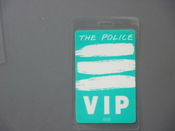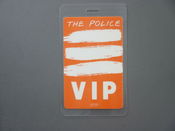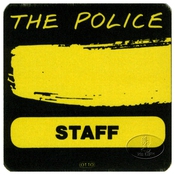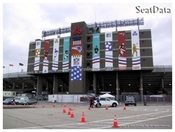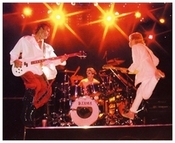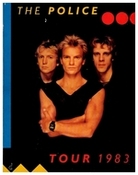
Synchronicity
Aug
10
1983
Boston, MA, US
Sullivan Stadiumwith The Fixx, A Flock Of Seagulls
Police take charge, inspire...
An hour before going on stage, the Police flew in by helicopter to a landing site behind Sullivan Stadium. Lead singer Sting said later that he was so nervous at flying over the capacity crowd of 61,000 that ''I was almost sick with fear.''
But that fear must have stayed in the helicopter because once Sting and his mates got on stage they were magnificent, playing a free-and-easy concert that was the perfect exclamation point to another clear night under the stars in Foxborough. It was a night in which rock 'n' roll was on the spot - with the future of stadium concerts in jeopardy if there was rowdiness - but the musicians and fans rose to the occasion, turning this into the summer highlight that all had wished from the start.
It was a night of unity, as a broad-based crowd of teens, college kids and more than a few over-30s pulled together under the aegis of-the Police, who were the ideal band to be on the hot seat since they've always symbolised the positive, spiritual side of rock as opposed to its decadent element.
A former English teacher who has an uncanny mixture of intelligence and charisma, Sting was the sparkplug. Looking like a friendly swashbuckler in baggy red trousers, black boots and a loose-fitting white shirt, he led the crowd through inspired singalongs while the younger teens in the audience shrieked as though he were John Lennon in the prime of the Beatles. Sting also again proved he is far more than just a pretty face. He played bass guitar, synthesiser and African pipes - during the haunting 'Walking In Your Footsteps' - and moved easily from subtlety to muscle in his vocals as excellent stadium sound framed his every coo and shout.
His gift for comedy was also apparent when he, guitarist Andy Summers and drummer Stewart Copeland suddenly left the stage late in the concert. Followed by a video camera which relayed the picture onto the massive Diamond Vision screen atop the stage, they went into a rear dressing room and literally took a British tea break. They all put on stovepipe dunce caps, mugged for the camera and sipped politely until Sting, with a fiendish smile, yanked the white tablecloth and upset all the cups as the crowd roared with vicarious laughter.
But there is no stereotyping this band. Playing at the peak of their powers - they may be the most popular group in the world at the moment - they also dared to be extremely cerebra, playing songs influenced by psychologist Carl Jung (Synchronicity I), by novelist Paul Bowles (the cosmic 'Tea in the Sahara', where Summers' echoplexed guitar added a floating atmosphere to a song dense in desert imagery) and by the mystic Gurdjieff (Spirits In The Material World).
Looking dapper in a white Great Gatsby suit, guitarist Summers grabbed more spotlight than usual with his venturesome reggae rhythms, pinging noises and occasional bursts of crying rock, while drummer Copeland was again his workhorse self and the group's undeniable anchor. The only complaints were the way the three backup singers were unfairly kept in the dark to the side of the stage; and to the band's tacky 'tie-in' with MTV, the music cable station which programmed music before the Police's set and shamelessly plugged itself.
Of the opening acts, the Fixx and A Flock of Seagulls, the former was the best received. Their funky syncopations (as in their current hit ''Saved by Zero'') and clever lyrics about trying to get one's life together in spite of the maze of everyday life, were bolstered by a heavier rock presence than expected. However, A Flock Of Seagulls faltered, as their bubblegum new wave sound often fell into repetitive ruts.It remained for the Police to take charge.
Although It has been only six years since Sting & Co. played at Boston's Rat club - a memory Sting alluded to twice last night - they showed their rise has not only been meteoric but also well deserved.
(c) The Boston Globe by Steve Morse
Police were arresting...
The crowd was revved up and ready when the Police hit the stage. For three hours the 60,000 people packed into Sullivan Stadium in Foxboro yesterday had sat patiently in the late afternoon sun. They listened to The Fixx and a Flock Of Seagulls, two up-and-coming young English bands and watched MTV's rock video on the scoreboard screen when no one was performing. But they were saving their enthusiasm for the Police.
At 7:15pm, the number one pop band in the world dashed on stage and dug into their title cut from their number one album 'Synchronicity'. A machine gushed forth billows of smoke that clouded the stage, flanked on both sides by giant screens painted with the red, yellow and blue stripes of the 'Synchronicity' album cover.
Sting dressed in a white jacket and bright red pants, was an energetic front man, singing, playing bass, and bouncing about the stage. Guitarist Andy Summers and drummer Stewart Copeland, stayed in the background concentrating on the music.
Filling out the blonde trio's sound were three female back-up singers, swathed in black robes from head to toe. Taped instrumental parts were also used occasionally.After five more songs from 'Synchronicity' and six older tunes including 'Message In A Bottle' and 'Spirits In The Material World', it was dark enough for the bands computer light system to be turned on. Sting introduced 'Hole In My Life' ''as a song played in the Rat Club in 1977''. Then it was on to 'Invisible Sun', which was illustrated by a scene of desolation in Northern Ireland, flashed on the screen overhead.
The audience lit thousands of matches at the song's end, making for an unforgettable sight. After 'King Of Pain', the group left the stage, but they were never out of sight. A video camera followed them into their dressing room and everyone watched the Police don comical stovepipe hats, sip tea, and destroy a table setting. Then they ran right back on stage and launched into their current number-one single 'Every Breath You Take'.
Did the Police live up to their suddenly exalted reputation? Absolutely. They are three very fine musicians and Sting's songs demonstrate a sensitivity and intelligence rarely heard in pop music. Right now, the Police look like the band of the '80's.
(c) USA Today by Larry Katz
An hour before going on stage, the Police flew in by helicopter to a landing site behind Sullivan Stadium. Lead singer Sting said later that he was so nervous at flying over the capacity crowd of 61,000 that ''I was almost sick with fear.''
But that fear must have stayed in the helicopter because once Sting and his mates got on stage they were magnificent, playing a free-and-easy concert that was the perfect exclamation point to another clear night under the stars in Foxborough. It was a night in which rock 'n' roll was on the spot - with the future of stadium concerts in jeopardy if there was rowdiness - but the musicians and fans rose to the occasion, turning this into the summer highlight that all had wished from the start.
It was a night of unity, as a broad-based crowd of teens, college kids and more than a few over-30s pulled together under the aegis of-the Police, who were the ideal band to be on the hot seat since they've always symbolised the positive, spiritual side of rock as opposed to its decadent element.
A former English teacher who has an uncanny mixture of intelligence and charisma, Sting was the sparkplug. Looking like a friendly swashbuckler in baggy red trousers, black boots and a loose-fitting white shirt, he led the crowd through inspired singalongs while the younger teens in the audience shrieked as though he were John Lennon in the prime of the Beatles. Sting also again proved he is far more than just a pretty face. He played bass guitar, synthesiser and African pipes - during the haunting 'Walking In Your Footsteps' - and moved easily from subtlety to muscle in his vocals as excellent stadium sound framed his every coo and shout.
His gift for comedy was also apparent when he, guitarist Andy Summers and drummer Stewart Copeland suddenly left the stage late in the concert. Followed by a video camera which relayed the picture onto the massive Diamond Vision screen atop the stage, they went into a rear dressing room and literally took a British tea break. They all put on stovepipe dunce caps, mugged for the camera and sipped politely until Sting, with a fiendish smile, yanked the white tablecloth and upset all the cups as the crowd roared with vicarious laughter.
But there is no stereotyping this band. Playing at the peak of their powers - they may be the most popular group in the world at the moment - they also dared to be extremely cerebra, playing songs influenced by psychologist Carl Jung (Synchronicity I), by novelist Paul Bowles (the cosmic 'Tea in the Sahara', where Summers' echoplexed guitar added a floating atmosphere to a song dense in desert imagery) and by the mystic Gurdjieff (Spirits In The Material World).
Looking dapper in a white Great Gatsby suit, guitarist Summers grabbed more spotlight than usual with his venturesome reggae rhythms, pinging noises and occasional bursts of crying rock, while drummer Copeland was again his workhorse self and the group's undeniable anchor. The only complaints were the way the three backup singers were unfairly kept in the dark to the side of the stage; and to the band's tacky 'tie-in' with MTV, the music cable station which programmed music before the Police's set and shamelessly plugged itself.
Of the opening acts, the Fixx and A Flock of Seagulls, the former was the best received. Their funky syncopations (as in their current hit ''Saved by Zero'') and clever lyrics about trying to get one's life together in spite of the maze of everyday life, were bolstered by a heavier rock presence than expected. However, A Flock Of Seagulls faltered, as their bubblegum new wave sound often fell into repetitive ruts.It remained for the Police to take charge.
Although It has been only six years since Sting & Co. played at Boston's Rat club - a memory Sting alluded to twice last night - they showed their rise has not only been meteoric but also well deserved.
(c) The Boston Globe by Steve Morse
Police were arresting...
The crowd was revved up and ready when the Police hit the stage. For three hours the 60,000 people packed into Sullivan Stadium in Foxboro yesterday had sat patiently in the late afternoon sun. They listened to The Fixx and a Flock Of Seagulls, two up-and-coming young English bands and watched MTV's rock video on the scoreboard screen when no one was performing. But they were saving their enthusiasm for the Police.
At 7:15pm, the number one pop band in the world dashed on stage and dug into their title cut from their number one album 'Synchronicity'. A machine gushed forth billows of smoke that clouded the stage, flanked on both sides by giant screens painted with the red, yellow and blue stripes of the 'Synchronicity' album cover.
Sting dressed in a white jacket and bright red pants, was an energetic front man, singing, playing bass, and bouncing about the stage. Guitarist Andy Summers and drummer Stewart Copeland, stayed in the background concentrating on the music.
Filling out the blonde trio's sound were three female back-up singers, swathed in black robes from head to toe. Taped instrumental parts were also used occasionally.After five more songs from 'Synchronicity' and six older tunes including 'Message In A Bottle' and 'Spirits In The Material World', it was dark enough for the bands computer light system to be turned on. Sting introduced 'Hole In My Life' ''as a song played in the Rat Club in 1977''. Then it was on to 'Invisible Sun', which was illustrated by a scene of desolation in Northern Ireland, flashed on the screen overhead.
The audience lit thousands of matches at the song's end, making for an unforgettable sight. After 'King Of Pain', the group left the stage, but they were never out of sight. A video camera followed them into their dressing room and everyone watched the Police don comical stovepipe hats, sip tea, and destroy a table setting. Then they ran right back on stage and launched into their current number-one single 'Every Breath You Take'.
Did the Police live up to their suddenly exalted reputation? Absolutely. They are three very fine musicians and Sting's songs demonstrate a sensitivity and intelligence rarely heard in pop music. Right now, the Police look like the band of the '80's.
(c) USA Today by Larry Katz

